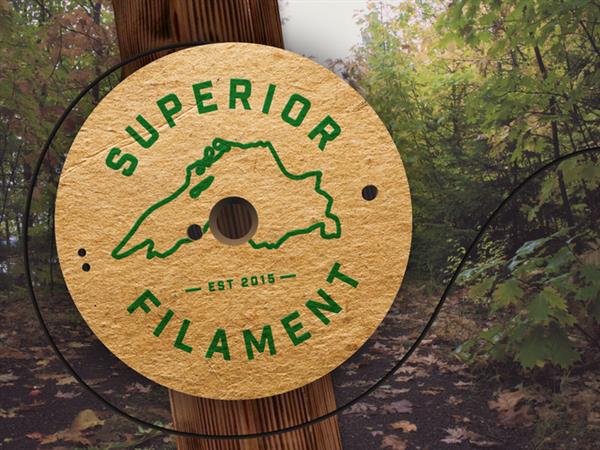In the past century, waste production has increased by a factor of ten. With each passing year, the Great Pacific Garbage Patch swells further with the debris of our modern lives. There is an epidemic in the United States of wastefulness and environmental irresponsibility. Fortunately, among our ranks are individuals who seek solutions to this problem through innovation and creativity. Superior Filament, a company founded by business administration graduate student Cedric Kennedy and mechanical engineering major Aubrey Woern, intends to do just that.
“We take biodegradable plastic and turn it into the material used in 3D printers,” said Kennedy, who also serves as the current president of the Entrepreneurs Club on campus. “Our ultimate goal would be to be able to collect waste, such as pop bottles, milk jugs and other materials that are usually thrown away, and then reprocess that into filament that can be used in printers.”
Although Superior Filament primarily sells to universities and researchers, Kennedy intends to pursue a second project to maximize the utility and convenience of 3D printing for the average consumer. Currently, a team of five Tech students led by computer network and system administration major Adam Weber are working to design a web application called Makerhub, which will allow ordinary people to access 3D printing technology. Makerhub will be available on web and mobile platforms on October 1 of this year.
“Our new project complements what we’re currently doing,” said Kennedy. “Makerhub connects people who already own 3D printers with small businesses and consumers who need them. Let’s say you wanted a 3D printed phone case. We would connect you with somebody who could print it for you. Then, you would pay for that service through our website. Our goal is to become a one-stop-shop for all things 3D printing.”
Despite not being able to directly supervise the fabrication of products ordered on Makerhub, Adam Weber, Makerhub team leader, assures that quality will not be an issue. “To ensure quality remains at a high standard, after each transaction, both the buyer and maker are prompted to rate the other party in terms of quality of print, speed of transaction, perceived value of transaction and whether or not they would work with the other party again,” said Weber. This same system of evaluation is used for many other community-based businesses, such as Airbnb.
The potential for 3D printing is endless. Construction, engineering and medicine have all been revolutionized by 3D printing technologies. By providing recycled filament for 3D printers, Superior Filament paves a clear path for environmentally friendly manufacturing practices. In the near future, the garbage floating in the Pacific Ocean may very well be used to print new organs for our sick, new homes for our homeless, and new parts for our machines.
To learn more about Superior Filament or to place an order, visit www.superiorfilament.com.





